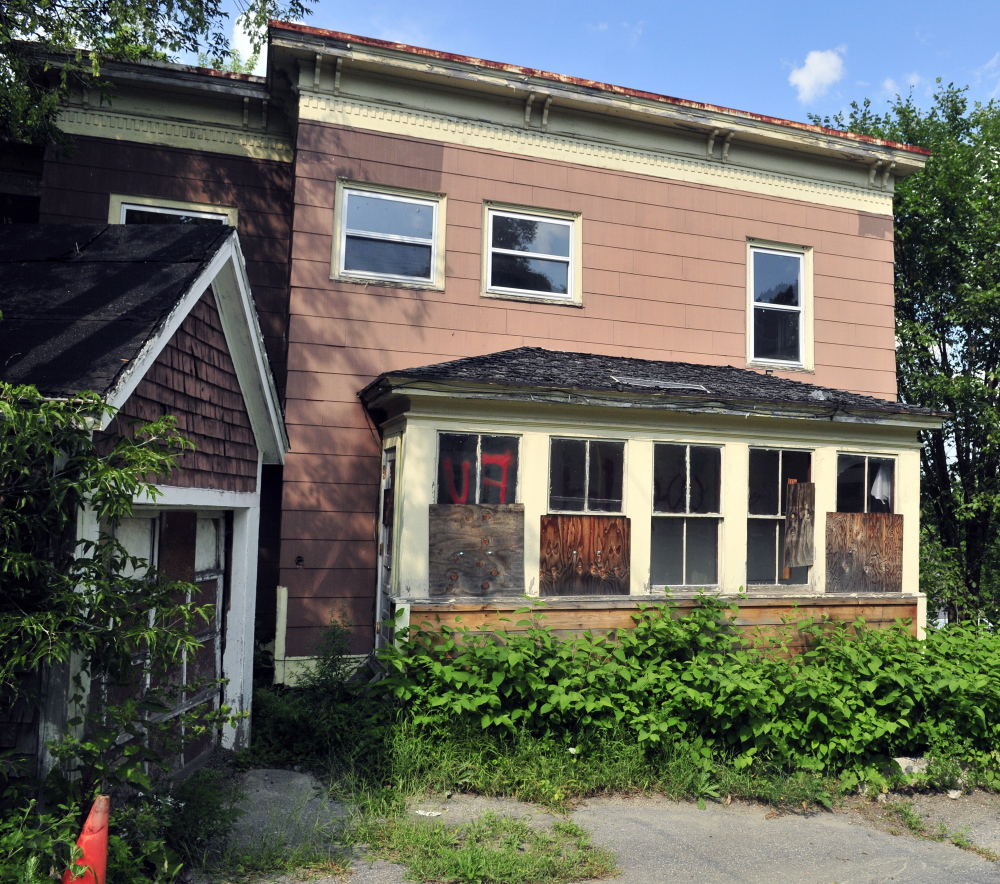AUGUSTA — City councilors sought to modify on Thursday a proposed vacant buildings ordinance to target abandoned properties that aren’t being maintained, rather than all vacant buildings as previously proposed.
Councilors said the changes were meant to avoid unintended consequences and burdens for responsible building owners who keep their buildings well maintained and secure even if they are vacant for various reasons.
The ordinance as proposed would require owners of buildings vacant for 60 days or more to obtain a vacant building registration permit from the city and pay a fee — of $200 for commercial entities, such as banks, or $100 for individual owners — and provide contact information for someone in Maine responsible for the property who could respond to building problems and notifications of code violations or other city actions related to the building.
The permits would last for six months, after which the building owners would have to renew them and pay the permit fee again.
The ordinance was drafted after residents and councilors complained about vacant homes being left unmaintained and unsecured and about not being able to reach anyone responsible for addressing those problems.
However, residents and some councilors said last week they were concerned the ordinance as drafted went too far and could have unintended consequences for homeowners.
“The comments I’m getting about this are from the owners of the neatest empty buildings in my ward,” said Ward 3 Councilor Patrick Paradis. “They’re worried about this proposal for registrations and so forth. There is severe anxiety about this.”
Last week resident and local real estate broker Kevin Judkins said the ordinance might have been meant to target large mortgage-issuing banks that don’t maintain property in foreclosure, but it also would place a burden on homeowners who might have to leave their homes unoccupied for a variety of reasons. He cited, as an example, someone ill or elderly leaving their home to be cared for by a relative for more than 60 days and having to pay a $100 fee every six months “for the privilege of not being able to live in her home.”
So on Thursday, councilors sought to change the ordinance so it wouldn’t apply to people who are marketing their buildings actively for rent or sale, building owners whose property is vacant but well-maintained, building owners who have to live outside of their homes temporarily for health reasons, or the owners of vacant buildings being renovated, though they couldn’t come to an agreement on new language for the ordinance.
Councilors agreed to take the ordinance back up for discussion at a Sept. 10 informational meeting.
Ward 2 City Councilor Darek Grant, who served with at-large Councilors Cecil Munson and Dale McCormick on the Vacant Properties Committee, which crafted the proposal, said often when some large banks or other financial institutions foreclose on a vacant or abandoned building, they don’t maintain the property and can’t be reached by neighbors or city officials when break-ins, damage, code violations or other problems occur.
However, Keith Luke, assistant development director, said the city’s attorney warned the city cannot adopt different property standards for foreclosed properties than those for other properties.
Grant said he would favor adding exceptions to the ordinance to address building owners’ concerns while still creating an ordinance that would allow the city to find the owners of problematic buildings in the city.
“At the end of the day, I just want to see, and I think this community wants to see, something in place that has some teeth and puts us in a direction where we can take a serious stand versus these types of properties in the city,” Grant said. “Many people have said this is long overdue.”
Nearly a year ago, resident Keith Ludden approached the City Council with concerns about a vacant property near his home in an otherwise well-kept neighborhood and asked the council to adopt property maintenance standards and enforce them. The house remains vacant, but maintenance has been done there in the meantime.
City officials say such situations seem to be increasing, with more buildings in foreclosure and left vacant rather than being resold and reoccupied.
Any building owners found to be in violation of the proposed new rules could be fined a civil penalty, under state statute, of a minimum of $100 and a maximum of $2,500, with each day in violation considered a separate offense.
Grant said there was interest initially in also setting property maintenance standards for vacant buildings as part of the new ordinance, but the city staff advised against setting property maintenance standards only for the owners of vacant properties.
Another committee, led by Ward 4 Councilor Anna Blodgett, is working on creating a new property maintenance ordinance that would apply to all buildings in the city, both occupied and vacant.
Some property maintenance standards are contained in the ordinance, but they are based on city building codes already in place.
Blodgett said drafting a property management ordinance will be a priority for her committee, and it could probably be done within the next few months.
The ordinance contains exceptions for people leaving their homes to live elsewhere temporarily, such as “snowbirds” who winter in Florida, as well as for vacation or resort facilities. It also exempts members of the armed forces on active duty.
Keith Edwards — 621-5647
kedwards@centralmaine.com
Twitter: @kedwardskj
Send questions/comments to the editors.



